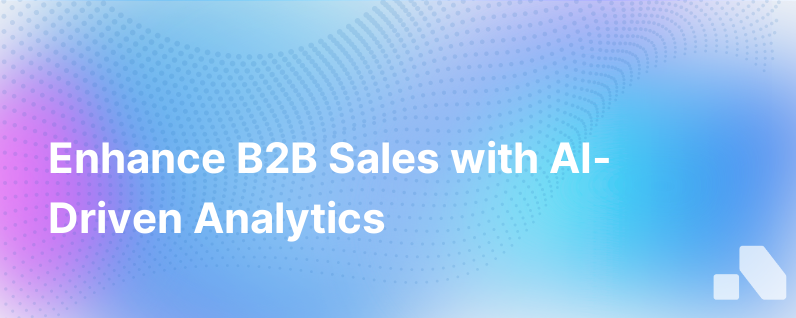Optimizing B2B Sales Performance with AI Driven Analytics
Published on November 15, 2023 by David Zhang
In today’s digital-first world, business-to-business (B2B) sales processes have evolved. The landscape is more competitive than ever, requiring sales professionals to deliver results faster and with more precision. Data is abundant, buyer journeys are complex, and personalization is not just preferred – it's expected. In this intricate maze of B2B sales, AI-driven analytics stands out as a transformative force, creating the much-needed edge for sales teams.
Here's an in-depth look at optimizing B2B sales performance with the power of AI.
Understanding AI-Driven Analytics in B2B Sales
AI-driven analytics combine artificial intelligence and machine learning with big data to offer unparalleled insights. It helps sales teams make sense of complex customer data, predict purchasing behaviors, and tailor engagements to specific buyer needs. AI algorithms analyze trends, forecast sales outcomes, and facilitate smarter decisions faster. The goal is to understand buyers better than they understand themselves—a North Star for sales excellence.
The AI Impact on Sales Performance
AI doesn’t just crunch numbers; it turns data into strategic action. Let's dive into a few ways AI ramps up sales performance:
-
Predictive Analytics: By harnessing historical and real-time data, AI forecasts future outcomes with remarkable accuracy. These predictions can shape sales strategies, resource allocation, and pipeline management.
-
Lead Scoring and Prioritization: AI analyzes scores of factors to identify the most promising leads, often uncovering high-value prospects that may have been overlooked. Sales efforts can then be channeled effectively.
-
Personalized Engagements: Data-driven insights enable hyper-personalization. AI suggests which content to share with prospects and when, increasing the relevance and impact of sales communications.
-
Sales Automation: Mundane tasks like data entry, scheduling, or follow-up emails can be automated, freeing sales reps to focus on relationship-building and complex negotiations.
-
Performance Analytics: AI monitoring of sales activities helps identify successful strategies and areas for improvement, ensuring continuous optimization of sales tactics.
Real-world Benefits of AI-Driven Analytics
Deploying AI in sales isn't about replacing humans; it's about augmenting human capabilities with data-driven intelligence. Consider the benefits:
-
Efficiency: AI reduces the time spent on manual data parsing, allowing sales teams to act swiftly in dynamic markets.
-
Accuracy: Projections and forecasts are more accurate, enabling better alignment between sales goals and market realities.
-
Customer Experience: With AI, the sales process is more attuned to buyer needs, leading to a smoother customer journey and higher satisfaction rates.
-
Scalability: AI provides scalable solutions that grow with your sales team, constantly learning and adapting to new patterns and insights.
Case Examples: AI in Action
Consider a scenario where a sales rep uses AI to prioritize leads. The AI takes into account not just who clicked the latest email, but complex behavior patterns and historic data points. It autonomously identifies a lead that, while quieter and more passive currently, has characteristics similar to past high-value conversions.
In another instance, an AI tool could advise a sales rep to share a case study with a prospect, noting that similar profiles have responded positively at this journey stage. This level of targeted insight would take humans hours of analysis; AI achieves it in seconds.
The Path to Optimization
Integrating AI-driven analytics into B2B sales demands meticulous planning and execution:
- Audit existing data for quality and completeness.
- Invest in AI-driven tools adept at sifting through large volumes of data.
- Train sales teams to understand and interpret AI-powered insights.
- Encourage adoption of AI tools and integrate their insights into everyday sales activities.
- Continuously feed AI systems with new data to improve their predictive capabilities.
Aomni: Bridging the AI Capability Gap
Creating an AI-powered sales engine from scratch is an arduous endeavor, but with Aomni, the journey becomes seamless. Aomni delivers real-time account research, competitive insights, and personalized sales content in 15 minutes with zero effort.
Envision AI doing the heavy lifting while sales reps engage in high-value interactions—this is what Aomni offers. It's an AI platform that's transforming how B2B sales are done by equipping sales teams with the strategic tools they need to outperform competition and close deals effectively.
In Conclusion
The potential of AI-driven analytics to rewrite the B2B sales playbook is vast. It's about navigating data efficiently, actioning insights accurately, and realizing business outcomes rapidly. The B2B landscape is ripe for this transformation, and the organizations willing to adopt and adapt will be the ones that thrive.
Remember, AI doesn’t replace the human touch in sales; it enhances it. It doesn’t remove relationships; it deepens them. It’s no longer just a smart move to leverage AI—it’s essential. And with platforms like Aomni making it more accessible, the question isn't if you should integrate AI-driven analytics, but how quickly you can start.
Sources:
- AI Revolutionizes B2B Sales: The Power of Automation and Personalization
- Mastering Personalization for Successful B2B Email Campaigns
- How AI is Transforming B2B Sales in 2023: Unlocking Success
- Harness the power of AI-based sales projection | Algolia
- Revolutionizing B2B Sales: Unleashing the Power of AI for Enhanced Success in 2024
- The Impact of AI on Forecasting Sales
- Sales Forecasting Using AI: The Future is Here